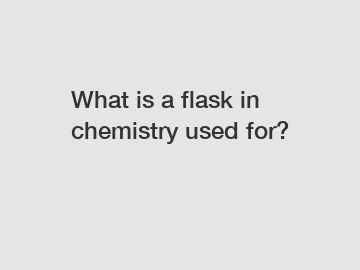What is a flask in chemistry used for?
What is a Flask in Chemistry Used For?
Chemistry is a vast scientific field that relies heavily on experimentation and observation. In order to carry out various chemical reactions and analyses, scientists use a wide range of equipment and tools. One of the most essential items in any chemistry lab is a flask. Flasks come in a variety of shapes and sizes, and each serves a specific purpose in chemical research. In this article, we will explore the different types of flasks used in chemistry and their respective functions.
Round-bottom Flask (Florence Flask).

The round-bottom flask, also known as the Florence flask, is a versatile piece of equipment commonly used in chemical experiments. It is named for its characteristic round shape at the bottom, which allows for uniform heating and boiling without hot spots. The round-bottom flask is often used for distillation, as it provides a large surface area for the evaporation and condensation processes. Additionally, it is frequently employed in reflux reactions, where the reactants are heated for an extended period under a condenser.
Erlenmeyer Flask.
Another commonly used flask in chemistry is the Erlenmeyer flask. Unlike the round-bottom flask, an Erlenmeyer flask has a conical shape with a flat bottom and a narrow neck. This design allows for easy swirling and mixing, making it ideal for titrations and reactions that involve vigorous stirring. The conical shape also prevents the flask from tipping over and helps to minimize the risk of spills. Additionally, the wide surface area at the top of the flask allows for efficient evaporation, making it useful for heating and boiling solutions.
Volumetric Flask.
Volumetric flasks are essential tools in quantitative analysis. These flasks are specifically designed to measure and contain a precise volume of liquid. Volumetric flasks typically have a narrow neck, a flat bottom, and a calibrated line, which marks the exact volume when the liquid is filled up to that line. Due to their accuracy, volumetric flasks are commonly used to prepare standard solutions with precise concentrations.
Recovery Flask.
When carrying out reactions that produce gases or volatile substances, a recovery flask is often employed. This type of flask is designed with additional features to capture and collect the gas or vapor released during the reaction. The most common example of a recovery flask is the gas collection flask used in the collection of gas over water experiments. It is connected to the reaction vessel via tubing, allowing the captured gas to displace the water and accumulate in the flask.
Conclusion.
Flasks play a critical role in various aspects of chemistry research and experimentation. From the round-bottom flask's ability to evenly heat and boil substances to the Erlenmeyer flask's suitability for mixing and titrations, each flask has a specific purpose. Volumetric flasks provide accurate measurements, while recovery flasks capture gases and vapors. These flasks, among many others, are indispensable tools that help chemists carry out experiments efficiently and effectively.
If you have any further questions about the use of flasks in chemistry or any other related topics, please don't hesitate to contact us. Our team of experts is always ready to assist you with your scientific inquiries.
Contact Us.
The company is the world’s best surface treatment for bottles, cell factory system, what do you use an erlenmeyer flask for supplier. We are your one-stop shop for all needs. Our staff are highly-specialized and will help you find the product you need.
177
0
0


Comments
All Comments (0)